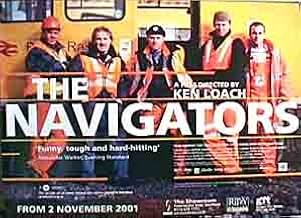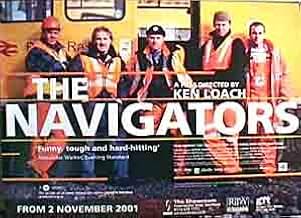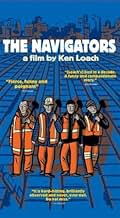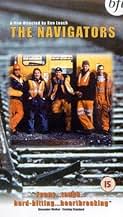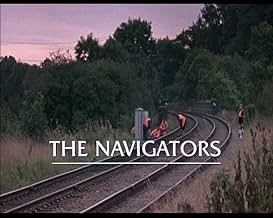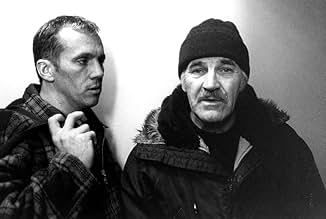VALUTAZIONE IMDb
6,9/10
3237
LA TUA VALUTAZIONE
Vivono nello Yorkshire. Lavorano per le ferrovie britanniche. E quando queste vengono privatizzate la loro vita cambia profondamente ma sono convinti che l'amicizia nata dal lavorare insieme... Leggi tuttoVivono nello Yorkshire. Lavorano per le ferrovie britanniche. E quando queste vengono privatizzate la loro vita cambia profondamente ma sono convinti che l'amicizia nata dal lavorare insieme li terrà uniti.Vivono nello Yorkshire. Lavorano per le ferrovie britanniche. E quando queste vengono privatizzate la loro vita cambia profondamente ma sono convinti che l'amicizia nata dal lavorare insieme li terrà uniti.
- Regia
- Sceneggiatura
- Star
- Ha vinto 1 BAFTA Award
- 3 vittorie e 3 candidature totali
Thomas Craig
- Mick
- (as Tom Craig)
Angela Forrest
- Tracy
- (as Angela Saville)
Recensioni in evidenza
I was lucky to see during the festival of Venice in Milan this very recent film from the good "social" director Ken Loach.
A group of friends in 1995 work in the Yorkshire for the ex-state owned: British Rail, which meanwhile has been completely fragmented in a tremendous number of small private companies that compete one against the other in order to be more competitive and gain the different bids. This situation leads the whole structure of each private company to a very profitable organisation offering a very poor service that has to save money from any single item of the fixed/variable costs structure of the economic statement.
Loach this time points out the lost of the social benefits of the labour class in a blackmail black and white situation where, if they want to get the job, they have to leave with these conditions which do not guarantee any type of social and physical safety to the worker.
It is not by chance that England has been the frame of several train accidents during the last years.
Unions are getting weaker and weaker and the so called "trouble makers" are led to leave the companies. The whole film is nicely viewed with some very fine, pretty uncommon in previous Loach's films, British humour. The scene where the supervisor has to read to the workers the message from the top management of productivity and their new rights is hilarious and superbly performed.
Rating: 6/10
A group of friends in 1995 work in the Yorkshire for the ex-state owned: British Rail, which meanwhile has been completely fragmented in a tremendous number of small private companies that compete one against the other in order to be more competitive and gain the different bids. This situation leads the whole structure of each private company to a very profitable organisation offering a very poor service that has to save money from any single item of the fixed/variable costs structure of the economic statement.
Loach this time points out the lost of the social benefits of the labour class in a blackmail black and white situation where, if they want to get the job, they have to leave with these conditions which do not guarantee any type of social and physical safety to the worker.
It is not by chance that England has been the frame of several train accidents during the last years.
Unions are getting weaker and weaker and the so called "trouble makers" are led to leave the companies. The whole film is nicely viewed with some very fine, pretty uncommon in previous Loach's films, British humour. The scene where the supervisor has to read to the workers the message from the top management of productivity and their new rights is hilarious and superbly performed.
Rating: 6/10
England. Mid 1990's. British Rail has been privatised and broken up into separate companies with all work put out to tender with the lowest bidder getting the job. This film follows a group of workers in a Yorkshire depot as the culture gradually changes from a world of union influence into a competitive business world.
This is a very sobering film - it deals with the railtrack situation but is more generally about the selling out of the working man and the beginning of the culture that views people as commodities and expenses, just like the rolling stock and the rails. The film opens with the boss of the depot announcing that the company has been privatised and that things will begin to change. It then follows the culture change over the course of time and concludes with a depressingly innocuous exchange that represents the shattering of previously unified spirits.
The culture change beings with mission statements, competing with work and setting levels for "acceptable deaths and continues with an end to previous agreements and a range of different companies. It is very hard to watch without being angry at the treatment of previously proud men as they are reduced to being costs. Workers are offered voluntary redundancy and those that refuse are gradually forced out. Bosses and chief execs identify those workers that have union ties and work to push them out. Workers are encouraged to join temp agencies at higher wages but without benefits or a steady work load thus saving the company money. Those that make trouble with the crews by insisting on safe working conditions etc are blackballed by the agencies and no more work is put their way. The pressure to cut costs to win jobs continues until unskilled workers are used for rail maintenance because they are paid cash in hand while other crews are forced to use "cost-effective" methods to work without a lookout and run the risk of severe accidents.
For those who think that the experiences of the workers are exaggerated for effect, Ken Loach received regular visits from railtrack workers (taking holidays or sick days) to advise on the film to make sure that it was representative of their experiences - they couldn't officially do it as they feared being blacklisted within the company. These things do go on - the rail companies are led by bosses who get huge bonuses from the shareholders as they drive down operating costs by compromising safety and reducing the workforce costs.
If the film has a major flaw it is the one-sided nature of the script. Workers are all represented as jovial, hardworking types, you know - salt of the earth, put down by bosses who only care about money. The latter may well be true but the way the workers constantly joke etc makes them look too good and the film has far too much sympathy for them for it's own good. Even when a group of workers do something completely abhorrent (the end of the film) it is presented as something that they had no choice about whereas really they should have carried some of the blame.
This film was released in Europe but only had a limited release in the UK as it was screened first on TV. It came shortly after the collapse of Railtrack as the Government put it into administration. It was screened days after the Government tried to cover up a report of failing train performances etc and it was screened as inquiries continue into serious derailments with significant loss of life.
In the UK one major accident killed many passengers and was put down to badly maintained rails. The Chief Exec has thus far escaped charges of manslaughter (despite the findings of the Health & Safety Executive) and also left his job with his huge contractually-obliged bonus, before moving on to another job on another board. For those who think that this film is exaggerated you truly have no idea what's going on in the world of big business.
As the Government continue plans for part privatisation of the London Underground and have further plans to privatise air traffic control this film is a very scary thing. Once we forget the people who make up workforces that only leave numbers. When shareholders become more important than the public and the workers then costs are all that matters and all corners are cut to boost the share price.
This film has it's flaws and will not change Government policy one bit. But this is a very sobering film that will open you eyes to what is done to satisfy shareholders and earn bonuses for upper management.
This is a very sobering film - it deals with the railtrack situation but is more generally about the selling out of the working man and the beginning of the culture that views people as commodities and expenses, just like the rolling stock and the rails. The film opens with the boss of the depot announcing that the company has been privatised and that things will begin to change. It then follows the culture change over the course of time and concludes with a depressingly innocuous exchange that represents the shattering of previously unified spirits.
The culture change beings with mission statements, competing with work and setting levels for "acceptable deaths and continues with an end to previous agreements and a range of different companies. It is very hard to watch without being angry at the treatment of previously proud men as they are reduced to being costs. Workers are offered voluntary redundancy and those that refuse are gradually forced out. Bosses and chief execs identify those workers that have union ties and work to push them out. Workers are encouraged to join temp agencies at higher wages but without benefits or a steady work load thus saving the company money. Those that make trouble with the crews by insisting on safe working conditions etc are blackballed by the agencies and no more work is put their way. The pressure to cut costs to win jobs continues until unskilled workers are used for rail maintenance because they are paid cash in hand while other crews are forced to use "cost-effective" methods to work without a lookout and run the risk of severe accidents.
For those who think that the experiences of the workers are exaggerated for effect, Ken Loach received regular visits from railtrack workers (taking holidays or sick days) to advise on the film to make sure that it was representative of their experiences - they couldn't officially do it as they feared being blacklisted within the company. These things do go on - the rail companies are led by bosses who get huge bonuses from the shareholders as they drive down operating costs by compromising safety and reducing the workforce costs.
If the film has a major flaw it is the one-sided nature of the script. Workers are all represented as jovial, hardworking types, you know - salt of the earth, put down by bosses who only care about money. The latter may well be true but the way the workers constantly joke etc makes them look too good and the film has far too much sympathy for them for it's own good. Even when a group of workers do something completely abhorrent (the end of the film) it is presented as something that they had no choice about whereas really they should have carried some of the blame.
This film was released in Europe but only had a limited release in the UK as it was screened first on TV. It came shortly after the collapse of Railtrack as the Government put it into administration. It was screened days after the Government tried to cover up a report of failing train performances etc and it was screened as inquiries continue into serious derailments with significant loss of life.
In the UK one major accident killed many passengers and was put down to badly maintained rails. The Chief Exec has thus far escaped charges of manslaughter (despite the findings of the Health & Safety Executive) and also left his job with his huge contractually-obliged bonus, before moving on to another job on another board. For those who think that this film is exaggerated you truly have no idea what's going on in the world of big business.
As the Government continue plans for part privatisation of the London Underground and have further plans to privatise air traffic control this film is a very scary thing. Once we forget the people who make up workforces that only leave numbers. When shareholders become more important than the public and the workers then costs are all that matters and all corners are cut to boost the share price.
This film has it's flaws and will not change Government policy one bit. But this is a very sobering film that will open you eyes to what is done to satisfy shareholders and earn bonuses for upper management.
Although it contains some funny moments, this film is no comedy; rather it is a biting satire of the mess that resulted when the Conservative Government in the UK decided to split up and privatise British Rail in 1995 (one wonders why they didn't go all the way and do the same to the highways) as seen through the eyes of track workers. Perhaps the most ludicrous moment is when their supervisor in their newly created regional private company tells the workers to take equipment out to dump bins and smash it up because "it isn't up to scratch, we've got to have high standards now." "But it's perfectly good, can't we sell it?" they protest. "What, sell it to the competition?" is the response. Later they are told that management's streamlining (making staff redundant) has been too successful: they are now too small to be viable and the depot has to close, the rest of the workers have to go. Aside from the almost documentary of the plight of Britain's rail network, there are personal interactions between the working class characters in their daily lives that viewers can empathise with. In all it's well cast, well scripted and well directed.
Ken Loach is known for his political/social films. This one is no different. The story of the consequences of the privation of British Rail is told through the eyes of the simple workers. They are the one who suffer the most from it. Loach is very sympathetic to them and doesn't hide it. In his opinion they are the "good guys". He tells their story with humor which draw us to their side. There is nothing wrong about that because he is right, they are the good guys.
Loach is also cleverly draw the impact privation have on the safety matters in this case and the unnecessary death it brings. As usual Loach uses a lot of non-professional actors and they do a very good job and we feel very close to them because they seem real and the problems they are facing seem also real.
This is a good film. No fireworks here, but a solid piece of work. The ending is a bit of disappointment, because it hangs in the air with no conclusion. And sometime all we need is a solid film. Just go and see it.
Loach is also cleverly draw the impact privation have on the safety matters in this case and the unnecessary death it brings. As usual Loach uses a lot of non-professional actors and they do a very good job and we feel very close to them because they seem real and the problems they are facing seem also real.
This is a good film. No fireworks here, but a solid piece of work. The ending is a bit of disappointment, because it hangs in the air with no conclusion. And sometime all we need is a solid film. Just go and see it.
THE NAVIGATORS is another excellent Ken Loach movie.
I had been putting off watching it because I thought it would be very gruelling and upsetting. I've been a fan of Ken Loach's movies for a long time but oftentimes I am not in the mood because I know I'll either cry or get upset (or both).
THE NAVIGATORS is different than his other films. It isn't a movie where you cry and have the feeling of being emotionally raked over the coals (just saw the haunting SWEET SIXTEEN and am still having the aftershocks from that one).
Anyway, THE NAVIGATORS is a movie that you watch and get angry. For anyone working in a globalized economy (i.e., almost everyone) the ideas behind the railworker's plight -- how absolutely screwed they are -- is nothing new. Yet I can't think of a movie that has illustrated this situation more clearly. It's actually shocking that there aren't more movies about how altered our working world has became. Possibly because this is such a current experience in the world today.
THE NAVIGATORS is a saga of working men, attractive, tough, garrulous, hard-working people who just want to work hard, make money, live their lives.
I recommend the movie highly.
I had been putting off watching it because I thought it would be very gruelling and upsetting. I've been a fan of Ken Loach's movies for a long time but oftentimes I am not in the mood because I know I'll either cry or get upset (or both).
THE NAVIGATORS is different than his other films. It isn't a movie where you cry and have the feeling of being emotionally raked over the coals (just saw the haunting SWEET SIXTEEN and am still having the aftershocks from that one).
Anyway, THE NAVIGATORS is a movie that you watch and get angry. For anyone working in a globalized economy (i.e., almost everyone) the ideas behind the railworker's plight -- how absolutely screwed they are -- is nothing new. Yet I can't think of a movie that has illustrated this situation more clearly. It's actually shocking that there aren't more movies about how altered our working world has became. Possibly because this is such a current experience in the world today.
THE NAVIGATORS is a saga of working men, attractive, tough, garrulous, hard-working people who just want to work hard, make money, live their lives.
I recommend the movie highly.
Lo sapevi?
- BlooperThe vest that John wears in the beginning (with the meter) and end (their last job), is actually a British Rail safety vest, over his Gilchrist coat (when he moves you can see the gray on it). He has the combination on before the company is renamed Gilchrist Engineering.
- ConnessioniReferenced in Il était une fois...: Moi, Daniel Blake (2021)
I più visti
Accedi per valutare e creare un elenco di titoli salvati per ottenere consigli personalizzati
- How long is The Navigators?Powered by Alexa
Dettagli
- Data di uscita
- Paesi di origine
- Siti ufficiali
- Lingua
- Celebre anche come
- The Navigators
- Luoghi delle riprese
- Aziende produttrici
- Vedi altri crediti dell’azienda su IMDbPro
Botteghino
- Lordo Stati Uniti e Canada
- 3052 USD
- Fine settimana di apertura Stati Uniti e Canada
- 1940 USD
- 23 feb 2003
- Lordo in tutto il mondo
- 1.807.686 USD
- Tempo di esecuzione
- 1h 36min(96 min)
- Colore
- Mix di suoni
- Proporzioni
- 1.85 : 1
Contribuisci a questa pagina
Suggerisci una modifica o aggiungi i contenuti mancanti

